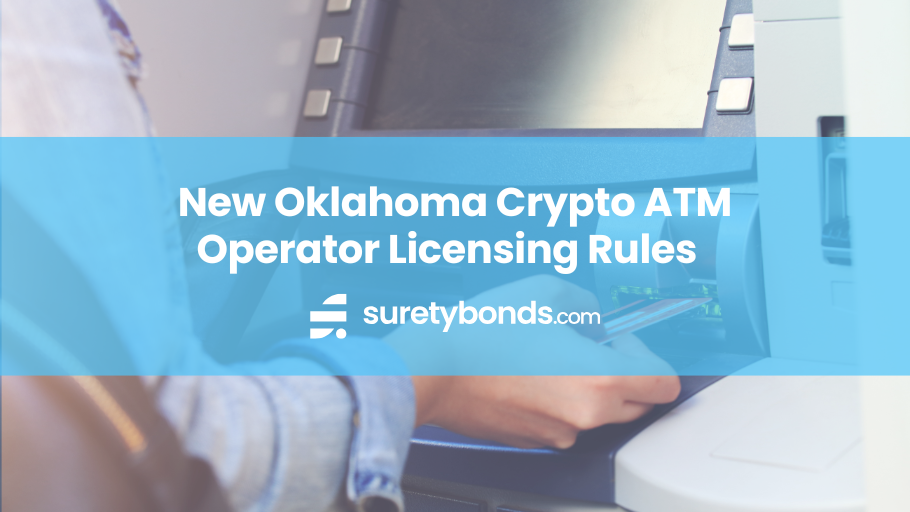New Oklahoma Crypto ATM Operator Licensing Rules
As of November 1, 2025, digital asset kiosk operators in Oklahoma must be licensed as money transmitters and meet stricter compliance requirements. This article will outline the new requirements, licensing process, and more.
Crypto ATMs are popping up everywhere — gas stations, convenience stores, retail outlets, vape and liquor stores, travel centers, and more — making it a potentially lucrative business opportunity.
However, if you operate a digital asset kiosk in Oklahoma, it’s important to be aware of the licensing and fraud prevention requirements. With these new rules, you have higher standards to meet, or risk penalties.
New Digital Kiosk Operator Licence Requirements at a Glance
Effective November 1, 2025, Senate Bill 1083 implemented under the Oklahoma Financial Reporting Act requires digital kiosk operators in Oklahoma to hold a money transmitter license.
There is also a $500,000 surety bond requirement, new reporting standards, and increased consumer protection protocols.
What Steps to Take Now
Here are the key actions you need to take as an Oklahoma crypto ATM operator to maintain licensing compliance going into 2026:
- File a $500,000 surety bond
- Complete the money transmitter license application
- Pay the $50 fee per kiosk location
Remember, you must be a licensed money transmitter to continue business as a kiosk operator.
Anti-Fraud & Consumer Protection Measures
You’ll also need to meet several new requirements for consumer protection and fraud prevention:
- Staff a customer service line during certain business hours
- Employ a full-time compliance officer
- Disclose the terms and conditions of kiosk transactions to customers
- Provide each customer with a detailed receipt Provide the state with 10-days notice if you plan to move a kiosk
- Submit quarterly reports of each kiosk’s location and operating status to NMLS and the Oklahoma State Banking Department
- Implement anti-fraud prevention protocols using blockchain technology
- Charge transaction fees of no more than 15%
- Do not accept transactions over $2,000 in value from a single customer in a day
Each of these new rules aim to protect vulnerable crypto ATM users from financial harm and create new safety standards.
Why Do Oklahoma Bitcoin ATM Operators Have New Laws?
This law was added in direct response to a rapidly increasing risk of fraud and theft related to cash-to-crypto transactions. Unfortunately, the most common victims of manipulative scams involving these kiosks are adults over 60.
The FBI received around 11,000 complaints in 2024 regarding cryptocurrency ATM scams. In Oklahoma specifically, residents lost a reported $37.7 million to crypto-related fraud, according to a 2025 AARP article.
An official 2024 release from the Oklahoma Attorney General, Gentner Drummond, officially warned consumers to be aware of banking scams involving digital asset kiosks, otherwise known as Bitcoin ATMs or crypto ATMs.
What Is a Digital Asset Kiosk?
A “digital asset kiosk” is defined as an electronic terminal acting as a mechanical agent of the kiosk operator to facilitate the exchange of digital assets for money, bank credit, or other digital assets.
The kiosks allow customers to add cash to the kiosk, then buy cryptocurrency. The ATM will send those crypto funds to whichever digital wallet address you choose for a fee.
Where Can I Get My $500,000 Money Transmitter Bond?
As a crypto ATM operator, you can get your Oklahoma money transmitter bond online from a surety agency like SuretyBonds.com, that typically issues these bonds within 24 hours or less.
How much does the bond cost? Don’t worry, you only pay a small percentage of the $500,000 coverage. With a strong credit score, you can expect to pay a 1–3% premium. You can get a free quote online from various providers.
How to Get an Oklahoma Money Transmitter License to Operate Digital Asset Kiosks
To become a licensed money transmitter in Oklahoma, digital kiosk operators must submit a license application packet including the following materials:
- Completed money transmitter license application form
- List of authorized delegates in Oklahoma (Appendix A on the application form)
- Original surety bond form in the amount of $500,000
- Evidence of a minimum $275,000 net worth
- Most recent 2 years unconsolidated financial statements
- Sample form of contract you will use with authorized delegates
- Payment for the $3,000 application fee, $2,000 license fee, and $50 fee per kiosk location
To apply to become a licensed money transmitter, submit everything through the NMLS website.
What Happens If I’m Not Compliant?
Now, digital asset kiosk operators will face penalties of $600-$2,000 per violation for operating without a license and kiosks can be seized by the state.
Under this act, crypto ATM operators also assume responsibility for fraudulent transactions if reported within 14 days by existing consumers or 2 days for new users. Additionally, victims of fraudulent crypto ATM transactions can now file civil suits against Oklahoma kiosk operators to recoup losses.
Where Do I Send My Quarterly Reports?
As a kiosk operator, you need to download the Quarterly Digital Current Kiosk Report form from banking.ok.gov. You’ll submit the completed form twice:
- Email an Excel version of the form to DigitalKioskReport@banking.ok.gov.
- Upload a PDF version of the form to NMSL under the additional requirements section. Make sure to name the file “OK-Kiosk-List”.
Reports must be submitted within 45 days of the quarter end.

